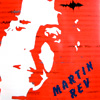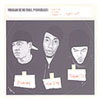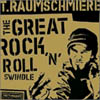Mute
 If you don't know why the Cabs became quite so big, then you probably haven't heard "Nag Nag Nag". Mute have another dodgy "Best Of" compilation coming out soon (which I'd heartily recommend to people who don't already own the Cabs' early output) and this single is meant to promote that. In the traditional method of record companies flogging dead horses, Mute have commissioned three or four new mixes of the track to complement the original (which also appears on the CD and first 12"). Firstly, Tiga and Zyntherius have a 'radio version' (on the CD) and 'full version' (on the second 12"). Mute say that Tiga "punks up" the vocals—I say he sounds like Stephen Tin Tin Duffy, and keep waiting for him to launch into the chorus of "Kiss Me". Mute say that this remix "bears all the hall-marks of an intense 'labour of love'"—I say it sounds like a crap cover version. Akufen contributes a far better mix (CD and second 12"). He appears to have had five good ideas for a mix and does about a minute-ish of each, and I'm not going to spoil it for you, but you'll end up grinning from ear to ear after hearing it. Finally Richard H. Kirk himself offers a true 21st century hardcore remix (CD and first 12") which is very much in the spirit of the original but in a thoroughly modern style. (I wanted to start dancing on the bus when listening to it again this morning.) Despite the crap Tiga and Zyntherius remixes, this has been a worthwhile project and I thoroughly recommend this release to anyone who reads The Brain.
If you don't know why the Cabs became quite so big, then you probably haven't heard "Nag Nag Nag". Mute have another dodgy "Best Of" compilation coming out soon (which I'd heartily recommend to people who don't already own the Cabs' early output) and this single is meant to promote that. In the traditional method of record companies flogging dead horses, Mute have commissioned three or four new mixes of the track to complement the original (which also appears on the CD and first 12"). Firstly, Tiga and Zyntherius have a 'radio version' (on the CD) and 'full version' (on the second 12"). Mute say that Tiga "punks up" the vocals—I say he sounds like Stephen Tin Tin Duffy, and keep waiting for him to launch into the chorus of "Kiss Me". Mute say that this remix "bears all the hall-marks of an intense 'labour of love'"—I say it sounds like a crap cover version. Akufen contributes a far better mix (CD and second 12"). He appears to have had five good ideas for a mix and does about a minute-ish of each, and I'm not going to spoil it for you, but you'll end up grinning from ear to ear after hearing it. Finally Richard H. Kirk himself offers a true 21st century hardcore remix (CD and first 12") which is very much in the spirit of the original but in a thoroughly modern style. (I wanted to start dancing on the bus when listening to it again this morning.) Despite the crap Tiga and Zyntherius remixes, this has been a worthwhile project and I thoroughly recommend this release to anyone who reads The Brain.
 If you don't know why the Cabs became quite so big, then you probably haven't heard "Nag Nag Nag". Mute have another dodgy "Best Of" compilation coming out soon (which I'd heartily recommend to people who don't already own the Cabs' early output) and this single is meant to promote that. In the traditional method of record companies flogging dead horses, Mute have commissioned three or four new mixes of the track to complement the original (which also appears on the CD and first 12"). Firstly, Tiga and Zyntherius have a 'radio version' (on the CD) and 'full version' (on the second 12"). Mute say that Tiga "punks up" the vocals—I say he sounds like Stephen Tin Tin Duffy, and keep waiting for him to launch into the chorus of "Kiss Me". Mute say that this remix "bears all the hall-marks of an intense 'labour of love'"—I say it sounds like a crap cover version. Akufen contributes a far better mix (CD and second 12"). He appears to have had five good ideas for a mix and does about a minute-ish of each, and I'm not going to spoil it for you, but you'll end up grinning from ear to ear after hearing it. Finally Richard H. Kirk himself offers a true 21st century hardcore remix (CD and first 12") which is very much in the spirit of the original but in a thoroughly modern style. (I wanted to start dancing on the bus when listening to it again this morning.) Despite the crap Tiga and Zyntherius remixes, this has been a worthwhile project and I thoroughly recommend this release to anyone who reads The Brain.
If you don't know why the Cabs became quite so big, then you probably haven't heard "Nag Nag Nag". Mute have another dodgy "Best Of" compilation coming out soon (which I'd heartily recommend to people who don't already own the Cabs' early output) and this single is meant to promote that. In the traditional method of record companies flogging dead horses, Mute have commissioned three or four new mixes of the track to complement the original (which also appears on the CD and first 12"). Firstly, Tiga and Zyntherius have a 'radio version' (on the CD) and 'full version' (on the second 12"). Mute say that Tiga "punks up" the vocals—I say he sounds like Stephen Tin Tin Duffy, and keep waiting for him to launch into the chorus of "Kiss Me". Mute say that this remix "bears all the hall-marks of an intense 'labour of love'"—I say it sounds like a crap cover version. Akufen contributes a far better mix (CD and second 12"). He appears to have had five good ideas for a mix and does about a minute-ish of each, and I'm not going to spoil it for you, but you'll end up grinning from ear to ear after hearing it. Finally Richard H. Kirk himself offers a true 21st century hardcore remix (CD and first 12") which is very much in the spirit of the original but in a thoroughly modern style. (I wanted to start dancing on the bus when listening to it again this morning.) Despite the crap Tiga and Zyntherius remixes, this has been a worthwhile project and I thoroughly recommend this release to anyone who reads The Brain.
samples:


 Martin Rev's first solo albums from 1980 and 81, as collected on this new CD, document what he was doing at the beginning of his post-Suicide solo career. As usual I have a hard time empathizing with the punk zeitgeist because I was really too young at the time (twelve in 1977) to comprehend the prevailing culture. I must have picked up some of it because occasionally an artifact from the period will unlock waves of fear and abhorrence in me,
Martin Rev's first solo albums from 1980 and 81, as collected on this new CD, document what he was doing at the beginning of his post-Suicide solo career. As usual I have a hard time empathizing with the punk zeitgeist because I was really too young at the time (twelve in 1977) to comprehend the prevailing culture. I must have picked up some of it because occasionally an artifact from the period will unlock waves of fear and abhorrence in me,  In recent years, some independent HipHop artists such as Antipop Consortium and the Definitive Jux family have managed to stimulate the genre by fusing it with elements of electronica in their backing tracks, making for more cohesive compositions and introducing them to a newer audience. In keeping with that direction, the ideal collaboration between rappers Mos Def and the windy city's Diverse with Prefuse 73 only certifies that development on "Wylin' Out." This EP is comprised of its title track in full form as well as an instrumental version, along with two separate remixes from K-Kruz and RJD2. Prefuse 73's electro-souled, signature syncopated instrumental makes for the perfect backdrop for the MCs to trade their quick, sharp and insightful rhymes with masterful precision. The K-Kruz remix eschews the existing backing track in favor of sampled Fender Rhodes, scratches and more broken up beats. While musically not as heavy as the original track, the vocals becoming more intelligible in the mix adds a new weight to it. RJD2's bouncy remix provides a repeated motif built from gritty big band-esque shots and subtle scratches driven by sampled drumkit and percussion, giving it a real 60s soundtrack groove. Rounding out the EP is the original instrumental version which showcases Prefuse 73's HipHop sensibility and knack for arranging as we've come to know and love. "Wylin' Out" has got my vote for the coolest collaboration of the year.
In recent years, some independent HipHop artists such as Antipop Consortium and the Definitive Jux family have managed to stimulate the genre by fusing it with elements of electronica in their backing tracks, making for more cohesive compositions and introducing them to a newer audience. In keeping with that direction, the ideal collaboration between rappers Mos Def and the windy city's Diverse with Prefuse 73 only certifies that development on "Wylin' Out." This EP is comprised of its title track in full form as well as an instrumental version, along with two separate remixes from K-Kruz and RJD2. Prefuse 73's electro-souled, signature syncopated instrumental makes for the perfect backdrop for the MCs to trade their quick, sharp and insightful rhymes with masterful precision. The K-Kruz remix eschews the existing backing track in favor of sampled Fender Rhodes, scratches and more broken up beats. While musically not as heavy as the original track, the vocals becoming more intelligible in the mix adds a new weight to it. RJD2's bouncy remix provides a repeated motif built from gritty big band-esque shots and subtle scratches driven by sampled drumkit and percussion, giving it a real 60s soundtrack groove. Rounding out the EP is the original instrumental version which showcases Prefuse 73's HipHop sensibility and knack for arranging as we've come to know and love. "Wylin' Out" has got my vote for the coolest collaboration of the year.  Following closely on Matador's 2001 twentieth anniversary edition of 1971's classic 'Underwater Moonlight,' 'Nextdoorland' is the first Soft Boys studio album in over 20 years. The whole 1980 lineup is here, and 'Nextdoorland' is peppered with the same giddy bouncing rhythms and insinuating Eastern scales that propelled the Boys' early collaborations. (Mastermind Robyn Hitchcock, of course, launched his strong solo career after the first life of the Soft Boys, whereas guitarist Kimberley Rew made a mark with the 80s hit "Walking on Sunshine" with Katrina and the Waves.) Even the cover image—of two candlelit mannequins with bleached mammalian skulls, propped up in bed—recalls the slightly misshapen, seaside dummies sported on 'Underwater Moonlight' (figures all constructed by Hitchcock's wife Lal). Like the latter day cover art, the contemporary Soft Boys shape their new sound with, essentially, the same materials, but there is certainly a shift in terrain. 'Nextdoorland' has less of the early Soft Boys' vitriol. It's definitely them, but more subdued, most notably missing the confusion, spit, and bile that lent their earlier lyrics the guitar lines' razor edge. Overall then, this pulsating album is similarly surrealistic (and on occasion incomprehensible) when it comes to the lyrics, but both lyrically and musically without as much substance as one would like. A few listeners might prefer the lighter touch?the parts are all distinct and crisp, the guitars absolutely sparkle, and the melodies here soar more often than they pitch back and forth. But, who woulda thunk, it's just not the same. Standout tracks here are "I Love Lucy," "Unprotected Love," and "Strings." ("My Mind is Connected?" edges on David Byrne of the 'David Byrne' period, and "Mr. Kennedy" and "Japanese Captain" are a little fogey for me.) Lasting lyrical impressions include: "Give me unprotected love / Like a baby in a football / Like a fish inside a glove" (sketchy!) and "Evil is the new enemy / Evil is the new bad [?] Take your partner by the middle / Like a burger in a griddle."
Following closely on Matador's 2001 twentieth anniversary edition of 1971's classic 'Underwater Moonlight,' 'Nextdoorland' is the first Soft Boys studio album in over 20 years. The whole 1980 lineup is here, and 'Nextdoorland' is peppered with the same giddy bouncing rhythms and insinuating Eastern scales that propelled the Boys' early collaborations. (Mastermind Robyn Hitchcock, of course, launched his strong solo career after the first life of the Soft Boys, whereas guitarist Kimberley Rew made a mark with the 80s hit "Walking on Sunshine" with Katrina and the Waves.) Even the cover image—of two candlelit mannequins with bleached mammalian skulls, propped up in bed—recalls the slightly misshapen, seaside dummies sported on 'Underwater Moonlight' (figures all constructed by Hitchcock's wife Lal). Like the latter day cover art, the contemporary Soft Boys shape their new sound with, essentially, the same materials, but there is certainly a shift in terrain. 'Nextdoorland' has less of the early Soft Boys' vitriol. It's definitely them, but more subdued, most notably missing the confusion, spit, and bile that lent their earlier lyrics the guitar lines' razor edge. Overall then, this pulsating album is similarly surrealistic (and on occasion incomprehensible) when it comes to the lyrics, but both lyrically and musically without as much substance as one would like. A few listeners might prefer the lighter touch?the parts are all distinct and crisp, the guitars absolutely sparkle, and the melodies here soar more often than they pitch back and forth. But, who woulda thunk, it's just not the same. Standout tracks here are "I Love Lucy," "Unprotected Love," and "Strings." ("My Mind is Connected?" edges on David Byrne of the 'David Byrne' period, and "Mr. Kennedy" and "Japanese Captain" are a little fogey for me.) Lasting lyrical impressions include: "Give me unprotected love / Like a baby in a football / Like a fish inside a glove" (sketchy!) and "Evil is the new enemy / Evil is the new bad [?] Take your partner by the middle / Like a burger in a griddle."  Tim Hecker's second outing on the Substractif sublabel of Alien8 with a 25-minute EP of DSP and plunderphonics based on none other than my favourite rockers, Van Halen. Fennesz's treatments of The Beach Boys and the Stones are one thing, but putting the opening riff from "Ain't Talkin' 'Bout Love" (from which the EP's title is taken) through the lo-fi digital mangler, as Hecker does on "Introducing Carl Cocks", is a more unlikely idea. With Eddie's classic and beautiful riff teased slowly into a perfect granular blur, it's an outstanding track, though what it has to do with techno-lord Carl Cox is anyone's idea. The remainder of the tracks' samples are split between musical sources and bitter interviews, on-stage raps, and radio coverage of the band's disputes, with comprehensible titles such as "Sammy Loves Eddie Hates David" but the baffling "The Return Of Sam Snead", whose only connection with VH I know of is that he's in a load of Dead Pools with poor old Eddie.
Tim Hecker's second outing on the Substractif sublabel of Alien8 with a 25-minute EP of DSP and plunderphonics based on none other than my favourite rockers, Van Halen. Fennesz's treatments of The Beach Boys and the Stones are one thing, but putting the opening riff from "Ain't Talkin' 'Bout Love" (from which the EP's title is taken) through the lo-fi digital mangler, as Hecker does on "Introducing Carl Cocks", is a more unlikely idea. With Eddie's classic and beautiful riff teased slowly into a perfect granular blur, it's an outstanding track, though what it has to do with techno-lord Carl Cox is anyone's idea. The remainder of the tracks' samples are split between musical sources and bitter interviews, on-stage raps, and radio coverage of the band's disputes, with comprehensible titles such as "Sammy Loves Eddie Hates David" but the baffling "The Return Of Sam Snead", whose only connection with VH I know of is that he's in a load of Dead Pools with poor old Eddie. Jonathan Coleclough has released several stunning albums of extended drones derived from acoustic sources, and 'Low Ground' is no exception. The sounds on this recording are surprisingly electronic; they're more digitally-veiled and alien than on Coleclough's other records. With five tracks, three of them collaborative and two solo, there's quite a bit of textural variety on this CD.
Jonathan Coleclough has released several stunning albums of extended drones derived from acoustic sources, and 'Low Ground' is no exception. The sounds on this recording are surprisingly electronic; they're more digitally-veiled and alien than on Coleclough's other records. With five tracks, three of them collaborative and two solo, there's quite a bit of textural variety on this CD. The direction of the latest five-song EP from Scott Herren as Savath + Savalas is in keeping with 2000's 'Folk Songs for Trains, Trees and Honey' in that the groundwork of electronica, sampling and live performance bleeds perfectly into each other and still gives off somewhat of an organic feel. "Rolls and Waves of Ignorance" opens the disc with a nice wash of swelling minor chords and percussion under climbing upright bass lines and melodic tenor saxophone, which weave throughout. The mood is tranquil yet somber and somewhat meditative, and, as the title may suggest, with an almost freejazz-type statement to it. "Paths in Soft Focus" grooves along nicely with some quirky keyboard and guitar arpeggiation and long bass tones which are all anchored by the solid drumming of Johnny Herndon (Tortoise, Isotope 217, A Grape Dope). One of the more splendid pieces of music I've heard lately would be "Folk Song for Cello," thanks in part to its brilliant arrangement and orchestration. Building from a plucked cello progression, acoustic guitar harmonics, accordion chords and a hammer dulcimer (!), the tune settles in to a laid-back groove of synth bass, tight drums and playful keyboard and vibe flourishes. "Decatur Queen" goes from repetitive acoustic guitar, upright bass and quietly squelching percussion to a ripping snare line that drives the tune into a full-sounding romp of rhythmic keyboards and wah guitar, complete with layers of horns while closing off the disc, "Rolls and Waves of Acknowledgement" brings the EP full-circle. This track follows the same compositional style as the opener, only more sparsely arranged and with the instrumentation of fuzz guitar, bowed strings and a fuller bass sound. Ironically enough, "Acknowledgement" sounds quite dark in comparison to "Ignorance." Way too short at just over seventeen minutes, this highly recommended EP may have you checking out the various other projects Mr. Herren has on the go at the moment (Prefuse 73, Delarosa + Asora) until another full length disc makes its way out there.
The direction of the latest five-song EP from Scott Herren as Savath + Savalas is in keeping with 2000's 'Folk Songs for Trains, Trees and Honey' in that the groundwork of electronica, sampling and live performance bleeds perfectly into each other and still gives off somewhat of an organic feel. "Rolls and Waves of Ignorance" opens the disc with a nice wash of swelling minor chords and percussion under climbing upright bass lines and melodic tenor saxophone, which weave throughout. The mood is tranquil yet somber and somewhat meditative, and, as the title may suggest, with an almost freejazz-type statement to it. "Paths in Soft Focus" grooves along nicely with some quirky keyboard and guitar arpeggiation and long bass tones which are all anchored by the solid drumming of Johnny Herndon (Tortoise, Isotope 217, A Grape Dope). One of the more splendid pieces of music I've heard lately would be "Folk Song for Cello," thanks in part to its brilliant arrangement and orchestration. Building from a plucked cello progression, acoustic guitar harmonics, accordion chords and a hammer dulcimer (!), the tune settles in to a laid-back groove of synth bass, tight drums and playful keyboard and vibe flourishes. "Decatur Queen" goes from repetitive acoustic guitar, upright bass and quietly squelching percussion to a ripping snare line that drives the tune into a full-sounding romp of rhythmic keyboards and wah guitar, complete with layers of horns while closing off the disc, "Rolls and Waves of Acknowledgement" brings the EP full-circle. This track follows the same compositional style as the opener, only more sparsely arranged and with the instrumentation of fuzz guitar, bowed strings and a fuller bass sound. Ironically enough, "Acknowledgement" sounds quite dark in comparison to "Ignorance." Way too short at just over seventeen minutes, this highly recommended EP may have you checking out the various other projects Mr. Herren has on the go at the moment (Prefuse 73, Delarosa + Asora) until another full length disc makes its way out there.  Is there too much I in your DM? Leading innovators in fun electronic dance music, Kompakt, has teamed up with the Berlin-based Shitkatapult label to release this full-lengther from Marco Haas (owner/operator of the Shitkatapult label). While it might not have the Coil-sample based tune or noise-based numbers from the recent live shows with Telefon Tel Aviv, it certainly has the fiery, raw energy that made the night F-U-N. Many readers might recognize the name from Hefty remixes or Kompakt compilations, but this release is far more deep, dark and sweaty than what might be expected from those tunes. Fuzzy digital bass and insanely punchy beats line a number of the tunes, the others are equally as fat-sounding; all are built of the stuff that makes the ass want to shake uncontrollably. (I can still even picture Marco's head bopping up and down just like Flat Eric.) Ripping the album title from an obvious punk reference, the artwork also clearly makes a stab at the punk days of stenciling. Heed the signs on the wall: this isn't a "pretty" or cute album. This is the stuff that can turn any dance floor into a seedy, sweaty meat market. Listening to songs like "Ravemusik," it seems painfully obvious that people like Chicks on Speed need to hire this German boy to make them some new beats. At only eight tracks, the album is a mighty fine treat and it's only the first of two full-length releases by Haas under the guise of T.Raumshmiere this year ('Anti' is due out in October through Hefty). Beg your local shops for this one or threaten the closest DJ shop with stink bombs if they look at you with the puppy-style cocked head.
Is there too much I in your DM? Leading innovators in fun electronic dance music, Kompakt, has teamed up with the Berlin-based Shitkatapult label to release this full-lengther from Marco Haas (owner/operator of the Shitkatapult label). While it might not have the Coil-sample based tune or noise-based numbers from the recent live shows with Telefon Tel Aviv, it certainly has the fiery, raw energy that made the night F-U-N. Many readers might recognize the name from Hefty remixes or Kompakt compilations, but this release is far more deep, dark and sweaty than what might be expected from those tunes. Fuzzy digital bass and insanely punchy beats line a number of the tunes, the others are equally as fat-sounding; all are built of the stuff that makes the ass want to shake uncontrollably. (I can still even picture Marco's head bopping up and down just like Flat Eric.) Ripping the album title from an obvious punk reference, the artwork also clearly makes a stab at the punk days of stenciling. Heed the signs on the wall: this isn't a "pretty" or cute album. This is the stuff that can turn any dance floor into a seedy, sweaty meat market. Listening to songs like "Ravemusik," it seems painfully obvious that people like Chicks on Speed need to hire this German boy to make them some new beats. At only eight tracks, the album is a mighty fine treat and it's only the first of two full-length releases by Haas under the guise of T.Raumshmiere this year ('Anti' is due out in October through Hefty). Beg your local shops for this one or threaten the closest DJ shop with stink bombs if they look at you with the puppy-style cocked head.  The Alternate Version of "Cake" is a reworking of Coleclough's original release: a single, 41-minute piece built mostly from processed field recordings, carefully controlled feedback, and bowed metal. It's an emotive and highly atmospheric work (if a bit linear), that spans a much wider dynamic range than his other compositions. The disc begins with recordings of birds and insects above a barely audible low-frequency rumble. This persists for several minutes at the edge of perception, occasionally augmented by footsteps, wind, and other noises captured in a peaceful landscape. Just as listening to the sounds of the forest begins to grow slightly tiresome, the piece starts moving forward, with layers of glistening, high-pitched feedback slowly emerging from the mix. The bird songs become bathed in gradually increasing amounts of reverb and effects-processing, and the rumble builds in volume and texture into a deep, ominous, metallic drone. All of the sounds used are detailed, and the resulting sum is quite interesting.
The Alternate Version of "Cake" is a reworking of Coleclough's original release: a single, 41-minute piece built mostly from processed field recordings, carefully controlled feedback, and bowed metal. It's an emotive and highly atmospheric work (if a bit linear), that spans a much wider dynamic range than his other compositions. The disc begins with recordings of birds and insects above a barely audible low-frequency rumble. This persists for several minutes at the edge of perception, occasionally augmented by footsteps, wind, and other noises captured in a peaceful landscape. Just as listening to the sounds of the forest begins to grow slightly tiresome, the piece starts moving forward, with layers of glistening, high-pitched feedback slowly emerging from the mix. The bird songs become bathed in gradually increasing amounts of reverb and effects-processing, and the rumble builds in volume and texture into a deep, ominous, metallic drone. All of the sounds used are detailed, and the resulting sum is quite interesting.
